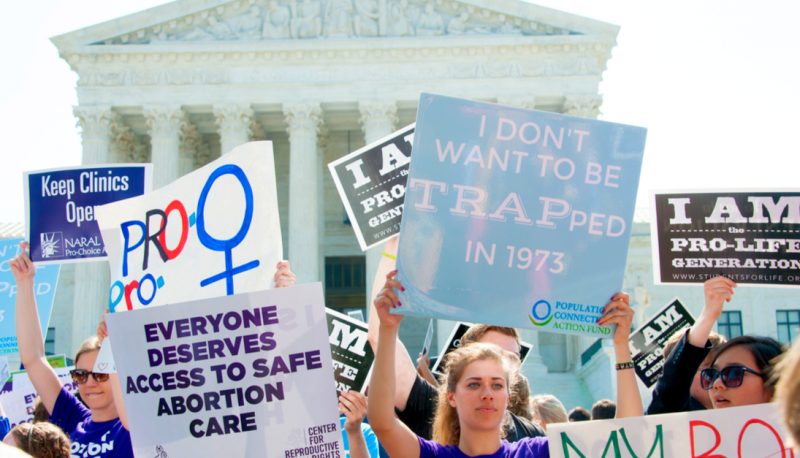On March 20, the U.S. Supreme Court will hear oral arguments in National Institute of Family and Life Advocates v. Becerra. People For the American Way Foundation is among 51 reproductive rights, civil rights, and social justice organizations that filed a friend-of-the-court brief in support of the California Reproductive FACT Act, which helps protect Californians from the dishonest tactics used by anti-choice crisis pregnancy centers. PFAW Foundation and our fellow amici cite the shame, stigma, deception, and a range of other harms—including threats to health and future fertility—that these facilities cause when they mislead patients about the type of services that are available. Our introduction follows below. Click here to download a PDF copy of the full brief.
Every day, many so-called “crisis pregnancy centers” providing limited services for pregnant women in California sow confusion about the services that they offer. California enacted the Reproductive FACT (Freedom, Accountability, Comprehensive Care, and Transparency) Act (the “Act”), 2015 Cal. Stats. Ch. 700, codified at Cal. Health & Safety Code §§ 123470-123473, to address the public health concerns posed by these centers’ (“Pregnancy Centers” or “PCs”) dishonest practices. As explained in the legislative history: “[PCs] pose as full-service women’s health clinics, but aim to discourage and prevent women from seeking abortions. The author [of the bill] conclude[d] that these intentionally deceptive advertising and counseling practices often confuse, misinform, and even intimidate women from making fully-informed, time-sensitive decisions about critical health care.” Reproductive FACT Act: Hearing on AB 775 Before the Assemb. Comm. on Health, 2015-2016 Leg. 3 (Cal. 2015).
To promote its compelling interest in ensuring women have access to comprehensive and timely healthcare information and services in the face of deception, California developed the Act’s neutral and factual disclosure requirements. Licensed PCs2 must post a sign notifying patients that information about state-funded reproductive health services—including prenatal care, family planning, and abortion—may be accessed by calling a county health department telephone number; unlicensed PCs must post a sign indicating that they do not employ a licensed medical professional.
Amici believe it is vital to women’s health and wellbeing that women be able to access timely, high-quality, individually tailored medical care regardless of whether they are seeking an abortion, family planning services, prenatal care, or counseling to help them determine their options.3 When a woman visits a facility that deliberately misleads her about the type of services that are available, or about whether that facility is even licensed to provide medical care, the Act’s modest disclosure requirements ensure she understands, immediately upon entering the facility, how to access the services she seeks.
In evaluating the Act’s requirements, the Court should take into account the context within which women encounter PCs—namely, that some PCs actively misrepresent their services. That deception creates numerous public health concerns that California sought to prevent with the Act’s reasonable and neutral requirements. Although this case comes to the Court on a motion for a preliminary injunction prior to discovery, before a record was created, discovery in similar cases and information available in the public record make clear that many PCs seek to dissuade women from obtaining an abortion or contraception through misinformation, shaming and judging, and delay, among other tactics. Furthermore, the public health concerns posed by PCs are not isolated, unique, or limited to California. Rather, PCs harm women across the country through tactics that are part of a campaign spearheaded by national, multimillion- dollar organizations to attract women seeking the very services PCs do not provide.
Amici have also gathered stories from women across the country who have been misled by PCs. As the stories demonstrate, women nationwide have experienced shame, stigma, and deception about their medical conditions, and some of these women suffered a range of other harms, including threats to their health and future fertility, loss of a wanted pregnancy, and forced continuation of a pregnancy as a result of PCs’ dishonest tactics. Women struggling to make ends meet are particularly burdened by the deceptive tactics employed by PCs.
The Court should affirm the ruling below under its context-based standard for assessing the constitutionality of compelled speech because the Act is a neutral, factual disclosure tailored to ensure that women seeking reproductive healthcare in California have information about how to obtain timely and appropriate care. Not only do Petitioners ask this Court to ignore the context of deceptive practices that justifies the Act, they also ask this Court to extend stronger First Amendment protections to PCs than to other types of healthcare providers, in particular those that offer abortion. No legal grounds support such a double standard.
2 Licensed healthcare providers that provide comprehensive reproductive healthcare services and are already capable of enrolling pregnant women in the state-sponsored programs on the spot are exempted from the Act because patients at those facilities are already receiving the information contained in the disclosure. See Cal. Health & Safety Code § 123471(c).
3 Amici refer to “women” throughout the brief for ease and consistency, but recognize that all people seek reproductive healthcare, including pregnant people who do not identify as women.
